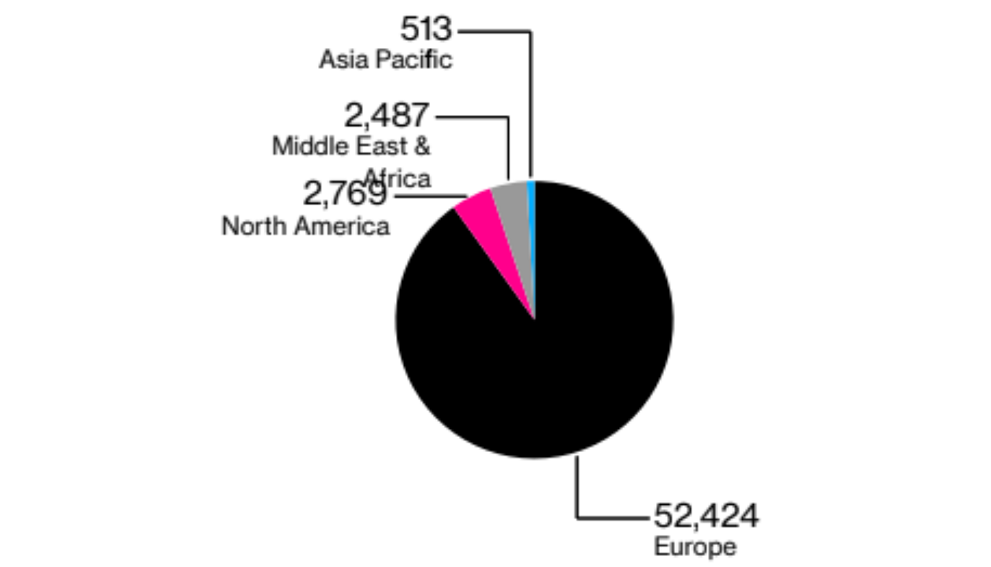Banks are laying off workers across the globe as revenue declines throughout the sector. According to reports, banks have announced nearly 60,000 job cuts so far this year, with most of the layoffs happening in Europe, especially in Germany.
Also read: Panic at 137 Bank Branches as RBI Limits Withdrawals to ₹1,000
Almost 60,000 Job Cuts
Bank employees are being laid off worldwide. Negative interest rates, political uncertainty and threats of trade wars on a global level have all played their part in eroding banks’ balance sheets, along with interest rate cuts which further reduce margins.
According to year-to-date company filings and labor union disclosures compiled by Bloomberg, banks have announced that they are cutting 58,200 jobs so far this year. The biggest layoffs are in Europe, where 52,424 jobs, or 90% of the total layoffs, are being slashed, as the European banking sector continues to struggle with profitability. Moreover, 2,769 workers in North America are being let go, as are 2,487 in the Middle East and Africa and 513 in the Asia Pacific region.

Furthermore, the data shows ten banks that have laid off the most workers in Europe, with Deutsche Bank leading the pack with 18,000 job cuts. The other banks on the top 10 list are Banco Santander, Commerzbank, HSBC, Barclays, Alfa Bank, KBC, Societe Generale, Caixabank, and the National Bank of Greece.
German Banks Lag Behind Others
The health of Germany’s financial sector has been a top concern for regulators and politicians for quite some time. The low interest rate environment, a global economic slowdown, trade tensions, geopolitical uncertainty, added to structural vulnerability and domestic economic weakness, have negatively impacted German banks. Lenders in Europe’s largest economy sit on large deposits so they are more dependent on lending than those in many other European countries.
The European banking sector has long faced calls for consolidation as banks struggle to generate profits. Two leading German banks — Deutsche Bank and Commerzbank — have attempted a merger, but it fell through early this year, resulting in the pair independently announcing major layoffs.

At the top of the downsize list is Deutsche Bank, which began laying off 18,000 workers in July as part of an $8.3 billion overhaul. According to reports, Germany’s largest bank plans to exit its equities sales and trading business as well as its fixed-income business, but will retain a small equity capital markets business. The bank had 91,737 employees at the end of 2018, almost 6,000 fewer than the previous year. The layoffs would shrink its workforce to roughly 74,000 employees by 2022. Deutsche Bank is also dealing with German authorities probing for information about the relation of its Frankfurt headquarters to Danske Bank, which is currently at the center of a massive money-laundering scandal.
Domestic rival Commerzbank, with about 1,000 branches and offices in almost 50 countries, is also downsizing. The German government is a major shareholder of this bank. Commerzbank announced last week a plan to lay off 4,300 of its 49,000 employees in some areas, but will add 2,000 jobs in “strategic areas.” A fifth of its branches will also be closed down in a strategy overhaul.

Layoffs Happening Worldwide
Other European and global banks have made similar announcements. “The main factors that could substantially impede European economic sentiment and growth remain the risk of further economic de-globalization, including an escalation of trade conflicts, Brexit and political turmoil in some euro area countries,” KBC Group detailed in its second-quarter earnings presentation for analysts. The bank-insurance group employs 42,000 people, has 1,389 bank branches, and operates primarily in Belgium, the Czech Republic, Slovakia, Hungary, Bulgaria and Ireland. The group also announced this month that its Belgian workforce will be reduced by 1,400 in three years.
Banking giant HSBC is also downsizing. Following the stepping down of former CEO John Flint after being on the job for only 18 months, the bank announced in August that it will cut 4,700 jobs. CFO Ewen Stevenson said up to 2% of the bank’s workforce will go. HSBC group employes 237,685 as of June 30.

British multinational bank Barclays already cut 3,000 jobs in the second quarter, CEO Jes Staley and CFO Tushar Morzaria confirmed on an earnings call in August. At the end of last year, the group employed 83,500 staff, according to its annual report.
Spain’s largest bank, Banco Santander, agreed with unions in June to lay off 3,223 workers in Spain as part of the bank’s effort to integrate Banco Popular, a financial services conglomerate with 1,600 branches across Spain. At the end of March, Santander had 32,366 employees and 4,366 branches in Spain. Earlier this year, the bank said it will close 140 branches in the U.K., putting more than 1,200 jobs at risk. Another Spanish bank, Caixabank, announced in January a layoff of 2,157 employees, cutting 7.3% of its total workforce. The largest Catalan bank also plans to close down over 800 branches in Spain out of its 4,461 branches in operation by 2021.

One of the largest privately owned banks in Russia, Alfa Bank, is also reducing its workforce. The bank currently employs more than 24,000 workers. CEO Vladimir Verkhoshinsky reportedly said that 3,000 employees, or 12% of the bank’s workforce, will be laid off by the end of the year. This number adds to the 2,000 workers who left the bank during the first quarter. According to reports, the layoffs are mainly due to the bank’s decision to migrate from providing loans in brick-and-mortar stores to offering them online.
France’s third-largest bank, Societe Generale, has also revealed its plans to cut 1,600 jobs, mainly at its corporate and investment banking arm. The bank, which employs 18,000 people in 30 countries, also said in April that it would cut 750 jobs in France.
Other banks that are downsizing include Citigroup, which revealed in July its plans to lay off hundreds of people. BNP Paribas reached an agreement with unions in March to cut as many as 2,500 jobs at its Belgian retail banking unit by 2021. The bank employs 13,000 people in Belgium. Further, the data compiled by Bloomberg shows that the National Bank of Greece is laying off 1,700 workers.
What do you think of banks’ massive layoffs? Let us know in the comments section below.
Disclaimer: This article is for informational purposes only. It is not an offer or solicitation of an offer to buy or sell, or as a recommendation, endorsement, or sponsorship of any products, services, or companies. Bitcoin.com does not provide investment, tax, legal, or accounting advice. Neither the company nor the author is responsible, directly or indirectly, for any damage or loss caused or alleged to be caused by or in connection with the use of or reliance on any content, goods or services mentioned in this article.
Images courtesy of Shutterstock and Bloomberg.
Did you know you can buy and sell BCH privately using our noncustodial, peer-to-peer Local Bitcoin Cash trading platform? The Local.Bitcoin.com marketplace has thousands of participants from all around the world trading BCH right now. And if you need a bitcoin wallet to securely store your coins, you can download one from us here.
The post Massive Layoffs: Banks Cutting Nearly 60,000 Jobs Worldwide appeared first on Bitcoin News.
Powered by WPeMatico
